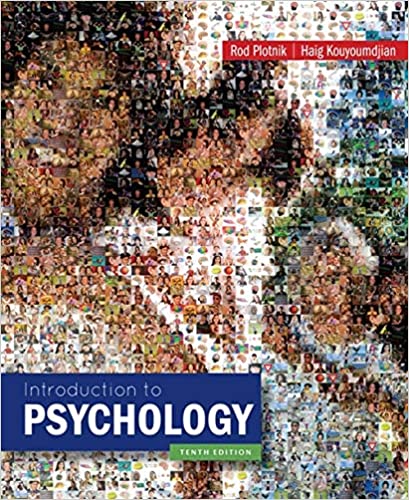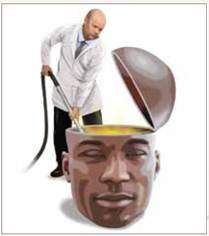
Introduction to Psychology 10th Edition by Rod Plotnik,Haig Kouyoumdjian
Edition 10ISBN: 978-1133939535
Introduction to Psychology 10th Edition by Rod Plotnik,Haig Kouyoumdjian
Edition 10ISBN: 978-1133939535 Exercise 20
Can Bad Memories Be Erased?
Imagine a world where no one had any bad memories. New research discoveries suggest that such a world may not be so implausible. For people who are frequently haunted by painful, unpleasant memories, there may be a simple way to alter or even erase the events from their mind. Scientists believe that after a person experiences a traumatic event, the body releases stress hormones, which act to make the bad memory stronger. To test this theory, Roger Pitman, a scientist, found patients who had just experienced a traumatic event and gave some of them a drug called propranolol, which blocks the release of stress hormones, and others a placebo. Patients also tape-recorded their recollection of the traumatic experience in detail. Months later, patients listened to the tapes. Over half of the placebo patients exhibited intense physical symptoms of anxiety and fear (high heart rate, sweaty palms), whereas none of the patients who received propranolol had such responses. Other research also supports the use of propranolol to decrease fear associated with bad memories. For instance, Merel Kindt and her colleagues created fearful memories in participants by administering shocks when they looked at pictures of spiders while instructed to "actively remember" the pictures. One day later, half of the participants were given propranolol and half a placebo. All were shown pictures of spiders again, and the participants given medication showed less fearful responses. The almost magical effects of propranolol occur because the drug affects brain cells in the amygdala, a critical brain structure involved in the processing of emotions in memories and learning fear responses. Using propranolol while actively remembering traumatic events seems to break down unpleasant memories by removing the fear responses associated with them. More recently, scientists have made strides in substantially decreasing the intensity of people's bad memories without the use of drugs. Scientists found that when we recall a memory, a brief window of opportunity presents itself when we can add to, alter, or possibly even erase that memory. If people are given new information during this brief time when they are actively recalling a memory, then it is the new, pleasant story that gets saved into long-term memory. The future of memory research is full of possibilities. There are, of course, many ethical concerns. For instance, what if murderers and rapists were able to erase from their memory the horrific actions they committed? They would thereby eliminate any feelings of guilt or remorse. Also, people could interfere with the justice system by erasing the memories of important eyewitnesses. Then, there's always the risk of erasing positive, wanted memories in the process. For now, scientific advances do help remove the trauma and fear associated with these memories. However, it may not be long before a scientific breakthrough makes it possible to completely erase memories in humans.
Question
It's possible to make a memory weaker or even disappear, but is it possible to create false memories and have people believe them to be true?
Imagine a world where no one had any bad memories. New research discoveries suggest that such a world may not be so implausible. For people who are frequently haunted by painful, unpleasant memories, there may be a simple way to alter or even erase the events from their mind. Scientists believe that after a person experiences a traumatic event, the body releases stress hormones, which act to make the bad memory stronger. To test this theory, Roger Pitman, a scientist, found patients who had just experienced a traumatic event and gave some of them a drug called propranolol, which blocks the release of stress hormones, and others a placebo. Patients also tape-recorded their recollection of the traumatic experience in detail. Months later, patients listened to the tapes. Over half of the placebo patients exhibited intense physical symptoms of anxiety and fear (high heart rate, sweaty palms), whereas none of the patients who received propranolol had such responses. Other research also supports the use of propranolol to decrease fear associated with bad memories. For instance, Merel Kindt and her colleagues created fearful memories in participants by administering shocks when they looked at pictures of spiders while instructed to "actively remember" the pictures. One day later, half of the participants were given propranolol and half a placebo. All were shown pictures of spiders again, and the participants given medication showed less fearful responses. The almost magical effects of propranolol occur because the drug affects brain cells in the amygdala, a critical brain structure involved in the processing of emotions in memories and learning fear responses. Using propranolol while actively remembering traumatic events seems to break down unpleasant memories by removing the fear responses associated with them. More recently, scientists have made strides in substantially decreasing the intensity of people's bad memories without the use of drugs. Scientists found that when we recall a memory, a brief window of opportunity presents itself when we can add to, alter, or possibly even erase that memory. If people are given new information during this brief time when they are actively recalling a memory, then it is the new, pleasant story that gets saved into long-term memory. The future of memory research is full of possibilities. There are, of course, many ethical concerns. For instance, what if murderers and rapists were able to erase from their memory the horrific actions they committed? They would thereby eliminate any feelings of guilt or remorse. Also, people could interfere with the justice system by erasing the memories of important eyewitnesses. Then, there's always the risk of erasing positive, wanted memories in the process. For now, scientific advances do help remove the trauma and fear associated with these memories. However, it may not be long before a scientific breakthrough makes it possible to completely erase memories in humans.

Question
It's possible to make a memory weaker or even disappear, but is it possible to create false memories and have people believe them to be true?
Explanation
Memory plays an important role in recall...
Introduction to Psychology 10th Edition by Rod Plotnik,Haig Kouyoumdjian
Why don’t you like this exercise?
Other Minimum 8 character and maximum 255 character
Character 255


